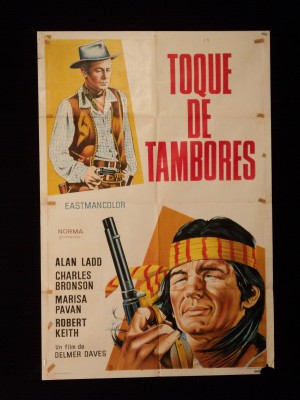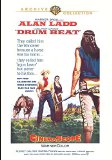| Reviews & Columns |
|
Reviews DVD TV on DVD Blu-ray 4K UHD International DVDs In Theaters Reviews by Studio Video Games Features Collector Series DVDs Easter Egg Database Interviews DVD Talk Radio Feature Articles Columns Anime Talk DVD Savant Horror DVDs The M.O.D. Squad Art House HD Talk Silent DVD
|
DVD Talk Forum |
|
|
| Resources |
|
DVD Price Search Customer Service #'s RCE Info Links |
|
Columns
|
|
|
Drum Beat
Drum Beat was among the first wave of movies in the new widescreen CinemaScope process. Those films tend toward the ugly, mainly due to the limitations of those earliest anamorphic lenses, resulting in everything from ghastly-looking dissolves to CinemaScope "mumps" (squashed faces), and a general softness to the image quickly solved with better anamorphics. The video transfer Drum Beat suffers from all these problems and more, though the reasons for this aren't clear. Part of the problem may be due to Warner Bros.' WarnerColor lab work, regarded as far inferior to processing and printing done by Technicolor and DeLuxe. The film elements sourced aren't in the best of shape, either, with reel change cues visible, and a lot of dirt and scratches at the heads and tails of each reel. It's also possible some modern-day computer tweaking was done to try to improve the image, but the results are strangely dark, even in location scenes set in broad daylight. The sum total of all this reminded me of the 16mm ‘scope prints I occasionally exhibited in high school and college. The 2.0 Dolby Digital Stereo mix is effective, however.
Warner Archive's DVD presents the film in enhanced widescreen with no extra features.
Argentinian poster whose distributor understood where the picture's real strengths lay.
The movie opens with a title card stating that its story is drawn from historical fact and changed only where necessary to dramatize the truth. This is partly true but greatly undermined by the decision to film the story, set in heavily forested southern Oregon, on location in Sedona, Arizona and the Coconino National Forest, whose mesas and deep red sandstone formations look nothing like Oregon at all.
U.S. President Ulysses S. Grant (Hayden Rorke) appoints former Indian fighter Johnny MacKay (Alan Ladd) peace commissioner for the territory, tasking him to negotiate a treaty with the Modoc Indian tribe. This he agrees to do, even though similar renegades slaughtered his own family years before.
The adult children of an old Modoc chief, Toby (Marisa Pavan) and Manok (Anthony Caruso) are, along with most of the tribe, eager to make peace. Another chief, however, who goes by the name Captain Jack (Charles Bronson), and his band of renegades, have only an insatiable thirst to kill every white settler they can find, and no interest at all in making peace or holding to any treaty.
The movie is much less interesting than Daves's Broken Arrow, the breakthrough movie Western that depicted Native Americans (and their suffering at the hands of whites) with an unprecedented level of empathy, suggesting love relationships between whites and Indians might be possible, even if Hollywood's Production Code disagreed.
In Drum Beat, there's a much more conventional love triangle among MacKay, Modoc Toby, and Nancy Meek (Audrey Dalton), the niece of a retired Army colonel. It's resolved in conventional Hollywood fashion.
What makes Drum Beat memorable is Charles Bronson, the first movie to bill the one-time Charles Buchinsky, who not long before this had, under that earlier billing, played Vincent Price's deaf-mute assistant in Warner's House of Wax (1953). Bronson is nearly a revelation. The costume designer wisely emphasizes his imposing physique: pecs and impressively muscular biceps are commonplace among action heroes and villains in movies today, but back in 1954 even Johnny Weissmuller at his peak didn't sport a powerful body like his. This was something new.
Moreover, Daves's screenplay and Bronson's performance fashion him as an eccentric cutthroat, preoccupied with collecting and wearing the medals and jackets of dead U.S. Cavalry soldiers. He's also depicted as a man with a sense of humor; conferring with a clergyman near the end of the film, Captain Jack tries to persuade him to take his place in heaven, if heaven is so desirable. He's vain yet insecure when his manhood is questioned, but also a formidable foe. Though the murders shown in the film are largely historically accurate, the real Captain Jack (born Kintpuash, "Strikes the Water Brashly") actually wanted to make peace, just like MacKay.
The movie has other good points, such as its strong supporting cast, including Robert Keith, Elisha Cook Jr. (memorable as a gun runner for the Indians), Richard Gaines, Frank Ferguson, Willis Bochney, and, near the end, Strother Martin. One particularly tense scene involves a tenuous peace conference, where Captain Jack already plans on murdering all the white people there. It's portrayed more or less accurately, the only time a general was killed during the entire Indian Wars.
Video & Audio
Drum Beat is presented in enhanced widescreen, approximating its original CinemaScope aspect ratio. For reasons described in more detail above, the image is disappointing, dark and soft with much obvious wear at the beginning and ends of reels. The audio is Dolby Digital 2.0 Stereo, English only, and fares much better, particularly Victor Young's richly orchestrated score. No subtitle options, and the disc is region-free. No Extra Features.
Parting Thoughts
Disappointing as a movie and disappointing in its video transfer, Drum Beat is still worthwhile for Charles Bronson's early-career performance. Recommended.
Stuart Galbraith IV is the Kyoto-based film historian and publisher-editor of World Cinema Paradise. His credits include film history books, DVD and Blu-ray audio commentaries and special features.
|
| Popular Reviews |
| Sponsored Links |
|
|
| Sponsored Links |
|
|
| Release List | Reviews | Shop | Newsletter | Forum | DVD Giveaways | Blu-Ray | Advertise |
|
Copyright 2024 DVDTalk.com All Rights Reserved. Legal Info, Privacy Policy, Terms of Use,
Manage Preferences,
Your Privacy Choices | |||||||















